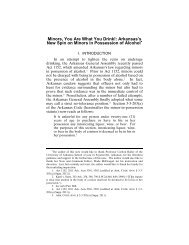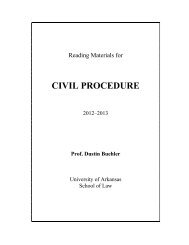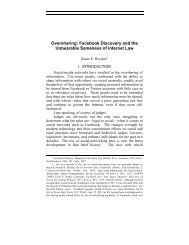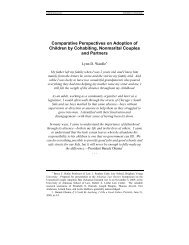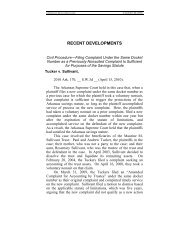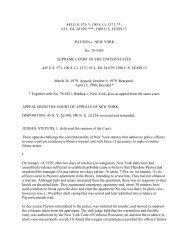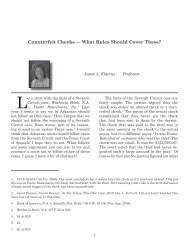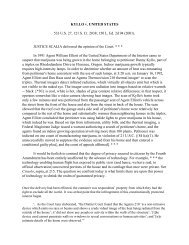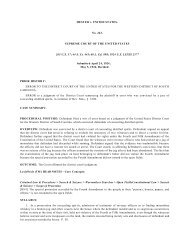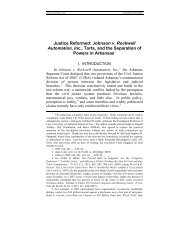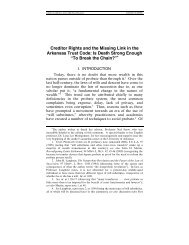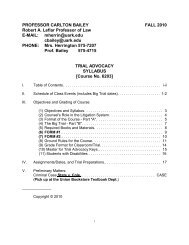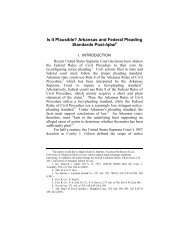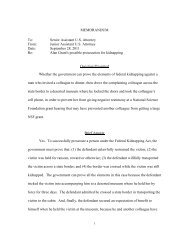Local Law Firm Making A Difference Norma Lea Beasley Entrance ...
Local Law Firm Making A Difference Norma Lea Beasley Entrance ...
Local Law Firm Making A Difference Norma Lea Beasley Entrance ...
Create successful ePaper yourself
Turn your PDF publications into a flip-book with our unique Google optimized e-Paper software.
1<br />
law briefs<br />
School of <strong>Law</strong> Names National Ag<strong>Law</strong> Center Directors<br />
Staff attorneys and assistant research professors Doug O’Brien<br />
and Harrison Pittman were named interim directors for the National<br />
Agricultural <strong>Law</strong> Center. The two will lead the center’s mission to conduct<br />
legal research into the most critical issues facing agriculture and food today.<br />
“We are proud to have Doug O’Brien and Harrison Pittman step up to<br />
become directors of such a prestigious national center during an exciting<br />
time for the School of <strong>Law</strong>,” said Dean Cyndi Nance, who appointed the<br />
two as interim directors for the academic year 2006-07.<br />
For nearly 20 years, the National Agricultural <strong>Law</strong> Center has<br />
researched legal aspects of agritourism, biofuels, land and water<br />
conservation and farm bills.<br />
O’Brien and Pittman have been around agriculture for their entire lives.<br />
O’Brien grew up on an Iowa farm, while Pittman grew up in an agricultural<br />
community in eastern Arkansas. Both earned their masters’ degrees in<br />
agricultural law at the University of Arkansas School of <strong>Law</strong>.<br />
O’Brien and Pittman will replace former director Michael Roberts, who<br />
has gone to work for the Venable <strong>Law</strong> <strong>Firm</strong> in Washington, D.C., where he<br />
will counsel the firm on food law and policy. Roberts<br />
will continue teaching at the School of <strong>Law</strong> as an<br />
adjunct professor in food law.<br />
“Working for the National Agricultural <strong>Law</strong><br />
Center was my favorite job, and I will miss it greatly,”<br />
said Roberts.<br />
He said the center is proud of its accomplishments,<br />
which include launching a nationally acclaimed<br />
Web site, nationalaglawcenter.org/ maintaining an<br />
excellent staff, including O’Brien and Pittman and<br />
assisting with the first student-run journal of its kind,<br />
The Journal of Food <strong>Law</strong> & Policy.<br />
O’Brien and Pittman plan to carry on the center’s mission to conduct<br />
legal research and provide objective, authoritative and scholarly articles to<br />
scholars, attorneys, policymakers and others in the agricultural community<br />
throughout the United States.<br />
School of <strong>Law</strong> Ranked ‘Most Diverse’<br />
The University of Arkansas School of <strong>Law</strong> is included among the “most<br />
diverse law schools in the country” as ranked by U.S. News and World<br />
Report’s 2007 edition of America’s Best Graduate Schools. According to<br />
the report, African American students make up 16 percent of the School<br />
of <strong>Law</strong>’s student body – that’s the fifth highest percentage of African<br />
Americans at any law school in the nation.<br />
“We are most proud of the fact that our largest minority community in<br />
the law school is African Americans,” says professor of law Carol Goforth.<br />
“They are historically underrepresented in the legal profession.”<br />
U.S. News and World Report started this category for diversity in law<br />
schools in 2006, and in both consecutive years, the University of Arkansas<br />
School of <strong>Law</strong> has been ranked among the most diverse law schools in the<br />
country.<br />
While the percentage of minority students in the entering class has<br />
increased from 18.9 percent in 2001 to 25.9 percent in 2005, the average<br />
LSAT scores and grade point averages have increased dramatically, says<br />
Goforth.<br />
The School of <strong>Law</strong> is indebted to the efforts of not only the law school’s<br />
associate dean of students, Jim Miller, who earned the Henry J. Ramsey<br />
Jr. Award for the <strong>Law</strong> Student Division of the American Bar Association,<br />
but to students, faculty, alumni and community members who donate their<br />
time and commitment to prospective students.<br />
“The law school makes room for everyone,” Goforth says.<br />
Professor Watkins Retires after 23 Years<br />
Professor John Watkins retired in August after more than 30 years in<br />
teaching, the last 23 as a member of the School of <strong>Law</strong> faculty. At the time<br />
of his retirement, he held the William H. Enfield Endowed Professorship.<br />
“John’s contributions to the law school, the bar and to legal scholarship<br />
are tremendous,” Dean Cyndi Nance said. “We will miss him greatly but<br />
wish him well in his new life.”<br />
The author of three books and four dozen journal articles, Professor<br />
Watkins specialized in Arkansas civil procedure and the state’s Freedom of<br />
Information Act.<br />
“I have always believed that some faculty members at state schools<br />
should devote their efforts to state law,” he said. “Not everyone should go<br />
that route, of course, but it was the path I chose.”<br />
For 19 years, Professor Watkins was a reporter – i.e., principal draftsman<br />
– for the Arkansas Supreme Court Committee on Civil Practice, which<br />
recommends changes in procedural rules to the Court. He also chaired the<br />
Arkansas Bar Association’s task force on implementation of Constitutional<br />
Amendment 80, which restructured the state’s court system. In 2002, the<br />
Association recognized him with an award for “distinguished service to the<br />
legal profession.”<br />
Professor Watkins plans to continue writing and is now at work on<br />
an article about a 1953 civil rights suit brought by a black baseball player<br />
denied the opportunity to play in an all-white professional league with<br />
teams in Arkansas, Louisiana and Mississippi. “Writing has been an<br />
important part of my adult life,” he explained, “and it’s not something I can<br />
immediately put aside.”<br />
A native Texan, Professor Watkins graduated with honors from the<br />
University of Texas School of <strong>Law</strong>, where he was note and comment editor<br />
of the . After clerking for the late Judge Homer Thornberry of the U.S.<br />
Court of Appeals for the Fifth Circuit, he practiced law with the prominent<br />
firm of Arnold & Porter in Washington, D.C. He taught at Baylor <strong>Law</strong><br />
School before moving to Arkansas in 1983.<br />
He and his wife Joan will continue to reside in Fayetteville. “At one<br />
time we thought about living elsewhere, but there are few places to live<br />
better than Fayetteville,” he said. “It’s home now.”<br />
law briefs<br />
1



